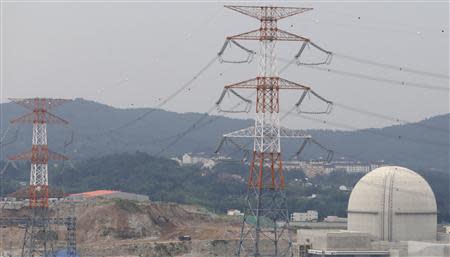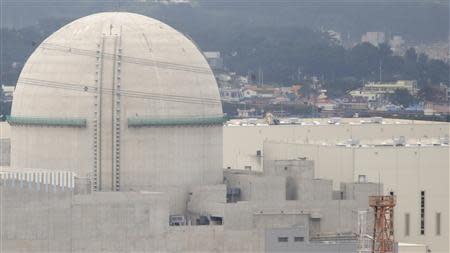South Korea nuclear issues, tower protests raise blackout risks
By Meeyoung Cho and Jane Chung MIRYANG, South Korea (Reuters) - South Korea faces possible power blackouts this winter and next summer, as cable safety issues and protests that are holding up completion of an ultra-high-voltage power line threaten to keep more nuclear reactors offline. Asia's fourth-largest economy generates a third of its electricity using nuclear power, primarily to replace oil and gas, for which South Korea relies almost entirely on imports. But six of its 23 reactors are offline, including three shut since May to replace cables supplied with forged safety certificates. In addition, another reactor will soon be closed to check the welding on a steam generator. South Korean prosecutors have arrested dozens of officials and parts makers on bribery and forgery charges in their investigation of the scandal over false documents. The cable issue has also delayed the start-up of two new reactors and could hold back a third, officials said. "It will be more difficult (to meet power demand) next summer than it was this summer. It will be also hard this winter," said Baek Jae-hyeon, vice president of state-run utility Korea Electric Power Corp (KEPCO). The government warned in May of "unprecedented" power shortages over the summer. South Korea barely avoided blackouts between June and August as it curbed power use by 6,000 megawatts (MW) via a nationwide energy-saving campaign. Consumption was held to 74,000 MW, less than a forecast record-high demand of 80,000 MW that would have overtasked the summer supply capability of 78,110 MW. Industry data shows South Korea's peak demand will be more than 81,000 MW this winter, about 5,000 MW lower than total capacity. But if the four nuclear reactors shut to check cables and welding do not restart, demand again threatens to overwhelm the available supply. Government officials declined to comment or give their own forecasts for the coming winter. The mid-year closures follow similar incidents in November 2012, when other reactors were shut over parts supplied with fake documents. South Korea's Nuclear Safety & Security Commission said on Monday it is conducting new tests on the replacement cables for the ones earlier supplied with false documents. There is no definite timeline on when the tests will be completed. If the replacement cables are rejected, cables would have to be imported, which would take another six months, other government and industry officials have said. Those arrested in the investigation of the cable scandal include a former CEO of the state-run Korea Hydro & Nuclear Power (KHNP), who faces bribery charges. KHNP, fully owned by KEPCO, runs all the country's nuclear plants. South Korea last suffered rolling blackouts in September 2011 when unexpectedly warm temperatures boosted power consumption after some power generators had already been taken down for post-summer maintenance. TOWER PROTESTS Even if the cables are replaced, two new reactors could be delayed from starts scheduled for next March and September, unless construction of 52 towers for ultra-high-voltage power lines is allowed to go ahead near the city of Miryang, 250 km (160 miles) southeast of Seoul. Protests there have held up about a third of a planned 90 kilometers of power line - supported by a total 161 towers - that would connect KEPCO's new Shin Kori No. 3 and No. 4 reactors and balance supply in the heavily industrial southeast. Major companies located there - such as the world's top shipbuilder Hyundai Heavy Industries, the country's major steelmaker POSCO and refiners SK Energy and S-Oil - are usually equipped with their own power generators and rolling blackouts affect them last. That means local residents of the area would suffer the most if the power lines are not completed. Despite the expected power crunch, Lee Nam-woo, 71, and tens of others mostly in their 60s to 80s who regularly meet in a town of Miryang, vowed not to give up the fight to prevent the 52 towers planned for their area. "We will never agree to build the towers ... even if compensated by 1 zillion won," said Lee. Opponents of the power lines include residents, and anti-nuclear and religious activists. They argue the towers will hurt asset values, harm the natural environment and cause cancers. KEPCO's Baek said completing the power line construction is critical to avoiding blackouts. He said that it would take at least eight months to complete the line, otherwise it would be impossible to transmit electricity from the Shin Kori reactors. Concerns over nuclear power have also been heightened in South Korea, as neighboring Japan continues to struggle with clean-up of the world's worst atomic disaster in three decades. "No place in the world has 12 reactors in one place. That's very dangerous," said Yi Gye-sam, one of those who opposes the Miryang power line, referring to the eventual number of reactors near the town of Kori, over 300 km southeast of Seoul. ($1 = 1097.90 Korean won) (Reporting by Meeyoung Cho and Jane Chung; Additional reporting by Ju-min Park; Editing by Tom Hogue)


